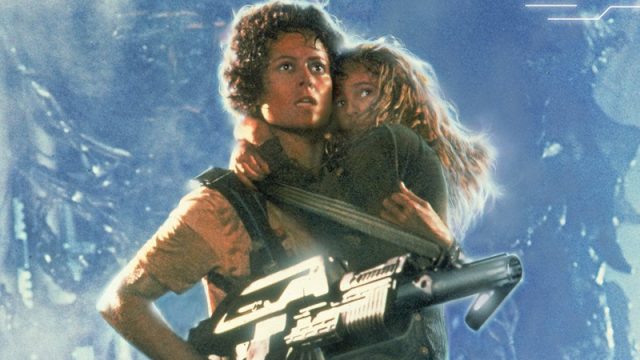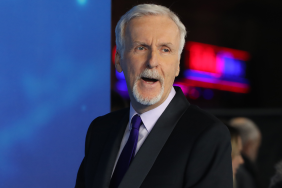As kids, my brother and I often wrapped our plastic weapons with duct tape and tip-toed through our home in search of extraterrestrial life. “Check those corners,” I would say while clasping my Nerf gun-turned-pulse rifle, which was attached to a yellow and green Super Soaker-turned grenade launcher. At some point, one of us would yell, “Contact!” kicking off a violent battle with imaginary, acid-spitting Xenomorphs. Then, one of us would inevitably get attacked and morph into the Alien King.
It didn’t make much sense then, but when your 11-year-old life revolves around James Cameron’s 1986 masterpiece Aliens, you do what you can with what you got. (To be fair, there were only a few Aliens-themed toys on the market aside from those 1992 Kenner figures.)
I first saw Aliens on network TV sometime in the early 90s, a detail I vividly remember because my parents turned off the film immediately after Ripley and Co. blasted off to space after saving Newt. That quick exit robbed me of the Ripley vs. Queen confrontation in the film’s final part. It didn’t matter. Everything I saw up until that point was magic — Ripley’s badassery, James Horner’s fierce score, the mind-blowing set pieces, the intense action, the quotable lines (“Game over man!”), and the fantastic supporting cast led by Michael Biehn, Bill Paxton, Paul Reiser, Lance Henricksen, Carrie Henn, and Jenette Goldstein. Aliens was pure gold.
The film often played on FOX Night at the Movies or during Sunday afternoons on random channels like WGN, where the editing and dubbing were particularly egregious. We had several recorded copies over the years with varying degrees of quality. I memorized when each commercial break occurred so I could zip through them on our high-tech VCR. It was the only way I could watch Aliens until I purchased the 1997 Widescreen Series VHS and got a good unedited look at Cameron’s masterwork. Since then, Aliens has steadily risen on my All-Time Favorite Movies List, and with good reason: this movie flat out rocks.
So, what makes Aliens work so well? And why does it look better than most movies produced today? James Cameron. The man. The myth. The legend. Cameron has directed just eight films, but each one (aside from Piranha II: The Spawning) is a classic — The Terminator, The Abyss, Terminator 2: Judgment Day, True Lies, Titanic, and Avatar. Wow.
Aliens arrived right after Terminator and helped cement Cameron as one of the great rising filmmakers of the 1980s. I won’t delve too much into the intense production — read J.W. Rinzler’s fantastic The Making of Aliens for all the juicy info — suffice to say, Cameron did a lot for very little. His attention to detail and willingness to push others to their breaking point makes Aliens a remarkable cinematic creation.
Of course, no film is complete without characters or story, and it’s here that Aliens truly excels. Interestingly, Cameron follows the basic template laid out by Ridley Scott’s equally stupendous Alien but ups the ante by pairing Ripley with a team of badass Space Marines and a legion of xenomorphs to battle.
RELATED: Aliens: Fireteam Elite Release Date Revealed for Late Summer
Cameron deepens Ripley’s character by giving her numerous obstacles to overcome. For starters, she has severe PTSD and overwhelming guilt/grief. After floating through space for 57 years, she returns to a universe she no longer recognizes and (in a deleted scene) learns her only daughter died while she was away — a plot point that directly ties in with her relationship with Newt.
Newt is the film’s biggest gamble. Most movies featuring kids usually suck. In this case, Newt works because she fleshes out Ripley’s character and gives the character something meaningful to fight for.
Cameron ensures the action in Aliens serves the story, not the other way around. Here, every choice made by our characters carries vast repercussions that lead to essential plot beats.
For example, when Drake and Vasquez defy orders and fire their M56 Smartguns during the firefight in the Alien Hive, they inadvertently rupture the cooling towers, thus establishing a need to flee LV-426 as quickly as possible. During the Futile Escape sequence, Vasquez and Gorman use a grenade to kill themselves, leading to Newt’s capture and Ripley’s rescue. After collecting Newt, Ripley tries to make her way back to the dropship, comes across the Alien Queen, and takes her anger out on the Nest, which pisses the Queen off, resulting in a chase that culminates with a wicked Mother v Mother confrontation.
It’s awesome.
RELATED: CS Reviews The Making of Aliens by J.W. Rinzler
Likewise, the climatic Ripley vs. Queen showdown packs a punch because both characters have pre-established motives based around their figurative children — Ripley defends Newt, and the Queen avenges her offspring. Weirdly, we understand the Queen because her actions mirror Ripley’s after she lost Newt.
Ripley’s actions throughout Aliens directly relate to the events of Alien. In the original film, Ripley, despite her better judgment, relents to her superiors, namely Dallas, Kane, Ash, and Mother, and waits too long to impose her will. Doing so might have saved more lives.
In Aliens, Ripley blatantly ignores Lieutenant Gorman’s orders and immediately takes control of the situation following the Alien Hive massacre.
When we first see Ripley in Aliens, she lies in cryosleep alone and endures horrible nightmares. Throughout the picture, she eliminates her greatest fear, saves crew members, and gains a daughter in Newt. She takes back everything stolen from her by the Xenomorphs, effectively providing her with a happily ever after.
Supporting players like Lt. Gorman and Vasquez also enjoy potent arcs. Facing death, the duo clasp hands like Vasquez and Drake did earlier in the film — a nifty detail that effectively visualizes their relationship. Early in the movie, Burke labels Hicks “a grunt” before adding, “no offense,” which Hicks later echoes when they decide to eliminate the corporate weasel.
These minor character details are as crucial to Aliens’ success as the aforementioned technical aspects and a reason the film holds up all these years later.
Look, I’ll be frank: Aliens is a perfect film. No, really, it’s a perfect film. Everything about this movie works, and I haven’t even delved into James Horner’s pulse-pounding, militaristic score:
Aliens is one of those movies I wish I could go back in time and watch with an audience on opening night. Can you imagine this moment with a midnight crowd?
Few films over the last 35 years match the relentlessness and the sheer spectacle of Aliens. James Cameron crafted the perfect sequel that stands as one of the all-time great action films and one of the most outstanding films ever made.











